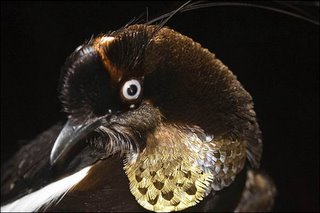 The team gathered the first photographic record of the Berlepsch's six-wired "lost" bird of paradise (Image: Bruce Beehler)
The team gathered the first photographic record of the Berlepsch's six-wired "lost" bird of paradise (Image: Bruce Beehler)The researchers spent nearly a month in the locality, detailing the wildlife and plantlife from the lower hills to near the summit of the Foja range, which reaches more than 2,000m in elevation.
"It's beautiful, untouched, unpopulated forest; there's no evidence of human impact or presence up in these mountains," Dr Beehler told the BBC News website.
One of the team's most remarkable discoveries was a honeyeater bird with a bright orange patch on its face - the first new bird species to be sighted on the island of New Guinea in more than 60 years.
The researchers also solved a major ornithological mystery - the location of the homeland of Berlepsch's six-wired bird of paradise.
 First described in the late 19th century through specimens collected by indigenous hunters from an unknown location on New Guinea, the species had been the focus of several subsequent expeditions that failed to find it.
First described in the late 19th century through specimens collected by indigenous hunters from an unknown location on New Guinea, the species had been the focus of several subsequent expeditions that failed to find it.
On only the second day of the team's expedition, the amazed scientists watched as a male Berlepsch's bird of paradise performed a mating dance for an attending female in the field camp.
It was the first time a live male of the species had been observed by Western scientists, and proved that the Foja Mountains was the species' true home.
"This bird had been filed away and forgotten; it had been lost. To rediscover it was, for me, in some ways, more exciting than finding the honeyeater. I spent 20 years working on birds of paradise; they're pretty darn sexy beasts," Dr Beehler enthused.
The team also recorded a golden-mantled tree kangaroo, which was previously thought to have been hunted to near-extinction.
Some of the creatures the scientists came into contact with were remarkably unafraid of humans. Long-beaked echidnas, primitive egg-laying mammals, were happy to be picked up. (Image: Stephen Richards)
from a BBC News article


